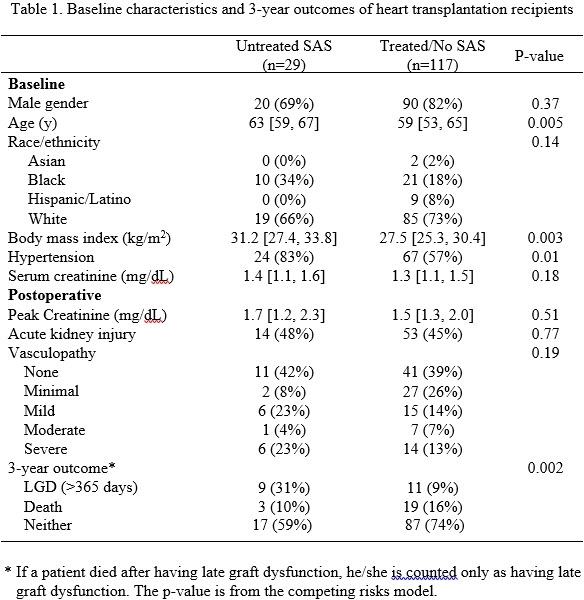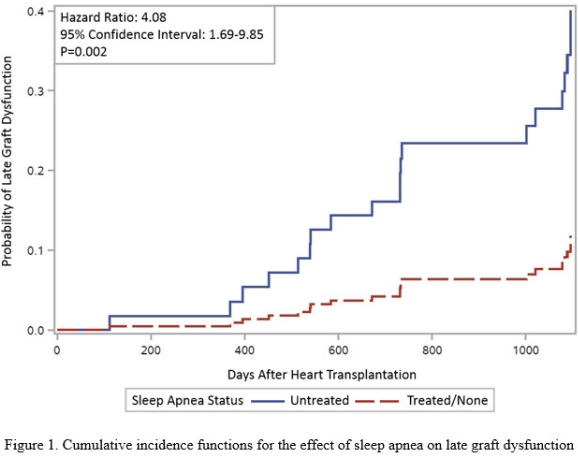Impact of Sleep Apnea Syndrome on Late Graft Dysfunction
1Center for Advanced Heart and Lung Disease, Baylor University Medical Center, Dallas, TX
2Baylor Heart and Vascular Institute, Baylor Scott & White Research Institute, Dallas, TX
3Annette C. and Harold C. Simmons Transplant Institute, Baylor Scott & White Research Institute, Dallas, TX.
Meeting: 2018 American Transplant Congress
Abstract number: B45
Keywords: Heart failure
Session Information
Session Name: Poster Session B: Heart and VADs: All Topics
Session Type: Poster Session
Date: Sunday, June 3, 2018
Session Time: 6:00pm-7:00pm
 Presentation Time: 6:00pm-7:00pm
Presentation Time: 6:00pm-7:00pm
Location: Hall 4EF
Background: Sleep apnea syndrome (SAS) is associated with higher risk of stroke, cardiovascular events, arrhythmias, hypertension, and congestive heart failure. However, there is a paucity of data on the prevalence of SAS among orthotopic heart transplant (OHT) recipients, on its impact on OHT outcomes, including late graft dysfunction (LGD).
Methods: In this review of consecutive OHT recipients at our center from 2012-2014, we assessed the effects of SAS on OHT, LGD, short-term complications, and 3-y mortality using competing risks analysis.
Results: Of 146 patients, 29 (20%) had untreated SAS at the time of OHT. Patients with untreated SAS were significantly older, heavier, and had more baseline hypertension than those with treated or no SAS (Table 1). While there were no differences in acute kidney injury, vasculopathy, or graft dysfunction within 1 year, there were differences in the rate of LGD at 3 years. Adjusted for death, those with untreated SAS were at 4.1 times the risk of developing LGD than those with treated or no SAS (95%CI: 1.7-9.9; Fig 1).
Conclusion: In this largest retrospective study of OHT patients with SAS, we found age, BMI, and hypertension to be associated with SAS. Over 3 years follow-up, patients with untreated SAS had higher risk of LGD than those with treated/no SAS. These results reiterate the importance of screening and treating patients for SAS as they undergo transplant selection. Multicenter studies may validate these findings, determine pathophysiology, and determine further clinical implications.
CITATION INFORMATION: Afzal A., Tecson K., Jamil A., Wazir A., Felius J., Qin H., Garcha P., Carey S., Hall S. Impact of Sleep Apnea Syndrome on Late Graft Dysfunction Am J Transplant. 2017;17 (suppl 3).
To cite this abstract in AMA style:
Afzal A, Tecson K, Jamil A, Wazir A, Felius J, Qin H, Garcha P, Carey S, Hall S. Impact of Sleep Apnea Syndrome on Late Graft Dysfunction [abstract]. https://atcmeetingabstracts.com/abstract/impact-of-sleep-apnea-syndrome-on-late-graft-dysfunction/. Accessed February 25, 2026.« Back to 2018 American Transplant Congress


